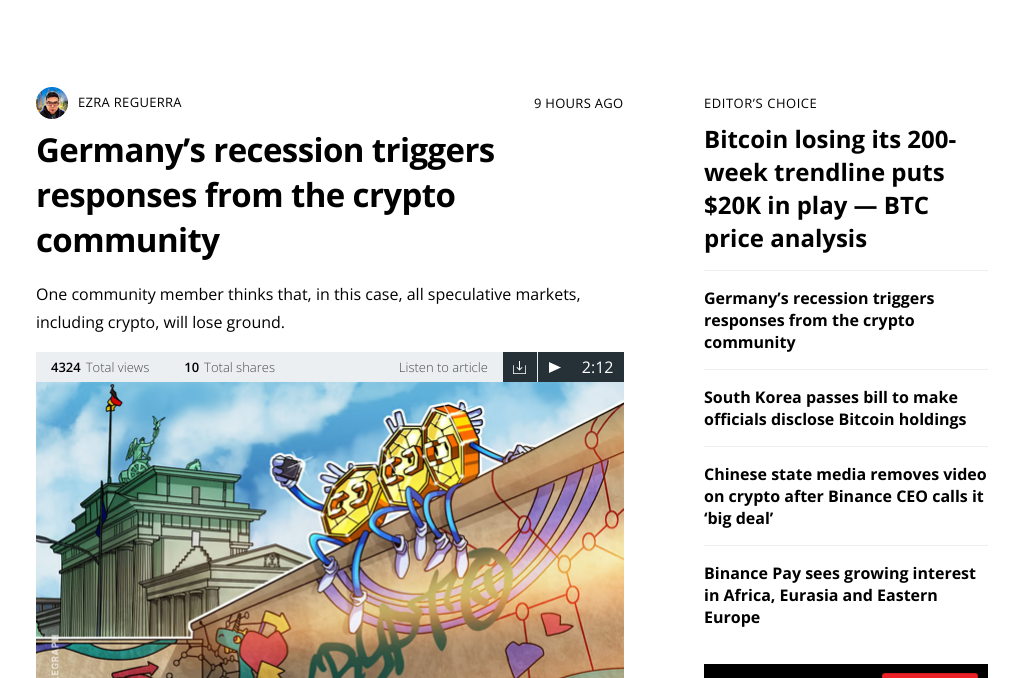Germany has officially entered a recession, as inflation and higher interest rates have curbed demand in Europe’s largest economy.[0] Official figures released on Thursday showed that economic output fell by 0.3% in the first quarter of 2023, marking the second consecutive quarter with a decreasing gross domestic product.[1] The drop was largely attributed to lower consumer spending due to higher prices amid inflation of 7.2%.[2] The country’s GDP reportedly fell by 0.5% in the last quarter of 2022, meaning that it met the technical definition of a recession. A recession is typically identified when there is a decline in the gross domestic product (GDP) in two successive quarters.[1] Germany’s Federal Statistical Office revised its estimate of first-quarter gross domestic production to a 0.3% quarterly contraction, from a previous estimate of growth. The country’s annual inflation rate was 7.6% in April, steadily declining from the peak 11.3% last fall.[3] The country’s growth has been hindered by the high energy prices and shortages of gas, both of which were exacerbated by Russia’s invasion of Ukraine in the beginning of last year.[4] Germany, which is known as the “factory of Europe” because of the scale of its manufacturing sector, was particularly hard hit.[4] Household spending in Germany shrank by 1.2% at the start of the year as high prices forced families to cut back.[5] Additionally, government spending declined by 4.9% relative to the preceding quarter.[6] The German economy is predicted to experience a slight growth in the second quarter of the year by the Bundesbank, its central bank. They anticipate that while consumer spending remains stagnant, the industry will bounce back to balance it out.[7] The Bundesbank’s outlook is based on a predicted rebound in industry offsetting stagnating consumer spending, with higher interest rates likely to continue weighing on both consumption and investment. Nevertheless, some analysts fear that the ongoing war in Ukraine, demographic changes, and the current energy transition will structurally weigh on the German economy in the coming years.[8]
0. “Germany slips into recession as inflation, higher interest bite” Daily Trust, 25 May. 2023, https://dailytrust.com/germany-slips-into-recession-as-inflation-higher-interest-bite/
1. “Germany’s recession triggers responses from the crypto community” Cointelegraph, 25 May. 2023, https://cointelegraph.com/news/germany-recession-crypto-community-reactions
2. “Germany in recession: Berlin braces for budget cut battle” POLITICO Europe, 25 May. 2023, https://www.politico.eu/article/germany-in-recession-berlin-braces-for-budget-cut-battle/
3. “Germany falls into recession as high inflation hits economy” Axios, 25 May. 2023, https://www.axios.com/2023/05/25/germany-falls-into-recession-high-inflation-hits-economy
4. “Germany drops into recession with 0.3% fall in GDP” The Times, 25 May. 2023, https://www.thetimes.co.uk/article/germany-drops-into-recession-with-0-3-fall-in-gdp-cm7lvsczh
5. “Germany sinks into recession – as UK avoids one” The Telegraph, 25 May. 2023, https://www.telegraph.co.uk/business/2023/05/25/germany-sinks-recession-olaf-scholz-avoided/
6. “Europe’s largest economy Germany slips into recession” Premium Times, 25 May. 2023, https://www.premiumtimesng.com/foreign/world-foreign/600519-europes-largest-economy-germany-slips-into-recession.html
7. “German economy to post modest growth in Q2 – Bundesbank” ForexLive, 24 May. 2023, https://www.forexlive.com/centralbank/german-economy-to-post-modest-growth-in-q2-bundesbank-20230524/
8. “New growth concerns for Germany after latest IFO numbers” ING Think, 24 May. 2023, https://think.ing.com/snaps/new-growth-concerns-germany-resend/
